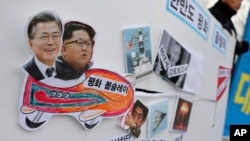North Korean leader Kim Jong Un’s invitation to South Korean President Moon Jae-in to visit Pyongyang could complicate the Trump administration’s diplomatic efforts to pressure the reclusive communist state to abandon its nuclear weapons program, analysts say.
Kim extended the rare invitation to the South Korean leader through his closest confidante: his only sister Kim Yo Jong, who was visiting the South as part of the North Korean delegation to the Winter Olympics, according to South Korea’s presidential office on Saturday.
Moon said he wanted to “create the environment for that to be able to happen,” according to the office.
Dialogue or pressure or both?
The North Korean diplomatic initiative comes amid growing international pressure, led by the United States, aimed at imposing maximum economic and diplomatic pressure on the regime. Former U.S. officials and analysts say the North Korean move could put Moon, who supports Trump’s pressure campaign while pursuing dialogue with the North, at odds with the Trump administration.
“The invitation is a very clever move by Kim Jong Un to drive a big wedge [between Washington and Seoul]. Kim has been masterful at public relations in regard to the summit and playing on feelings for Korean unity,” said Robert Manning, senior fellow at the Atlantic Council.
In the past, inter-Korean summits often resulted in a substantial economic aid to Pyongyang. If Moon follows in the footsteps of his predecessors, it would hurt the Trump administration’s pressure campaign against the North, according to Ken Gause, director of the International Affairs Group at the Center for Naval Analyses.
“If it leads to promises of aid, then it would definitely undermine the maximum pressure strategy,” Gause said, referring to the proposed summit between the two Koreas.
Bruce Klingner, a former CIA analyst who is now senior research fellow at the conservative Heritage Foundation, warned Seoul could violate international sanctions by providing economic aid to Pyongyang.
“Moon should realize that offering economic benefits for symbolic North Korean gestures is not only ineffectual but would themselves risk being violations of U.N. resolutions,” Klingner said.
Balancing act
The Moon government has been engaging in a delicate balancing act between Pyongyang and its longtime ally Washington after Kim Jong Un offered to send a delegation to the Olympics in the South. Moon has accommodated the North’s demands on Olympics participation in hopes of persuading Pyongyang to return to the negotiating table to discuss denuclearization, while trying to allay concern in Washington that the North was using a “charm offensive” to simply ease sanctions and earn time to complete its nuclear weapons program.
The North’s invitation, Manning said, apparently puts Seoul in a difficult position, where it needs to prove its efforts will bear fruit.
“President Moon must balance his desire for North-South reconciliation with his policy of denuclearization,” Manning said.
Dennis Wilder, a Georgetown University assistant professor, who served as National Security Council senior director for East Asian affairs during the George W. Bush administration, suggested Moon should accept the invitation only if Pyongyang agrees to discuss denuclearization with Washington.
“My own view is that President Moon should only go if there is a strong signal from the North of willingness to engage seriously with the Trump administration,” Wilder said.
Joseph DeTrani, former U.S. special envoy for nuclear talks with North Korea, said Moon should make it clear to Kim that he wants to discuss the nuclear and missile issues at the summit. The former envoy believes Moon should use the meeting as an opportunity to push Kim to accept his predecessor’s promise to denuclearize.
Washington unmoved
The latest North Korean diplomatic overture does not appear to have discouraged Washington from pursuing its strategy of pressure.
U.S. Vice President Mike Pence, who led a U.S. delegation to the Olympic Games, told reporters that he and Moon discussed the South Korean leader’s meeting with Kim Jong Un’s sister, adding he remains confident about Seoul’s support for the pressure strategy.
“There is no daylight between the United States, the Republic of Korea and Japan on the need to continue to isolate North Korea economically and diplomatically until they abandon their nuclear and ballistic missile programs,” Pence said.







